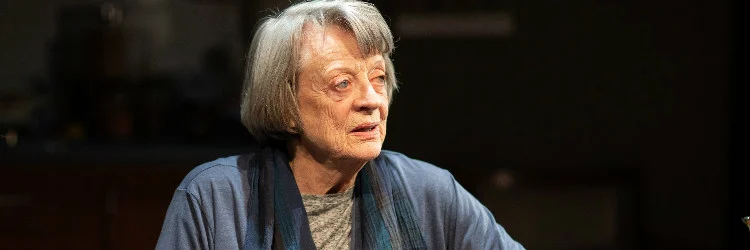Review - Maggie Smith returns to the stage in A German Life at the Bridge Theatre
An elderly woman sitting in a chair, sharing her memories for 1 hour and 40 minutes without an interval, doesn't sound very theatrical. But since that woman is played by Maggie Smith, returning to the stage for the first time since the short-lived The Lady from Dubuque at the Haymarket in 2007, it has inevitably become a major event, selling out its entire run before it even opened.
The bad news is that it's therefore impossible to get a ticket. But for those that have already got them, this is more than just an event and a landmark, but a skilfully and understated evening of thrilling acting by a veteran performer still at the very height of her powers.
With Eileen Atkins (84) and Vanessa Redgrave (82), recently back on London stage in The Height of the Storm and The Inheritance respectively, and Glenda Jackson (82) currently playing King Lear on Broadway, Maggie Smith's return to her theatrical roots at 84 is more proof of the brilliance and longevity of British actors - and their irresistible attraction to and devotion to the stage.
The quietly domestic staging by Jonathan Kent is mostly static; Smith doesn't leave the chair in the tidy apartment she is sitting in. But the actor is one of the most animated on the London stage. She plays Brunhilde Pomsel, a secretary who narrated her own life story in the 2016 documentary film of the same title.
It's a story about denial and survival, complicity and complexity. Just how culpable are people like her who found themselves working deep within the Nazi regime? Was it just a job? Didn't they see what was happening? And what could they do about it anyway?
Pomsel found herself working in the office of Joseph Goebbels, head of the Nazi's propaganda machine. She claims obliviousness to what was happening - and also reveals a deep humanity and humility, too. Earlier in the 1930s, she worked for a Jew in the morning and a Nazi in the afternoon. After the war and her own imprisonment, she searches for a Jewish friend, only to find she perished in the camps.
Smith narrates this all with quiet gravity and grace (her speech is electronically amplified, but not intrusively so). Smith's own vocal inflections and mannerisms - her way of repeating certain words in a sentence, her natural pauses and conversational stumbles - perfectly match the character she is playing.
Back in 1996, Maggie Smith gave another solo stage performance in Alan Bennett's Bed Among the Lentils (that she'd previously filmed) at the West End's Comedy Theatre (now the Pinter), that to this day remains one of the very greatest stage acting performances I've ever seen. As my colleague Matt Wolf put it at the time in a review for Variety, "In a season of putative bravura performances, Smith's is the real thing: an investigation of character so wounding and yet so hilarious that audiences may be unsure where a wicked comedienne's capacity for laughter leaves off and the lacerating empathy of a true theatre artist begins."
There's not much laughter this time around, but the lacerating empathy is still there - and quietly and vividly on display. She is, again, unmissable. I hope that for those who haven't got tickets, it is at least filmed.
A German Life is at the Bridge Theatre until 11th May.
Photo credit: Helen Maybanks
Originally published on
